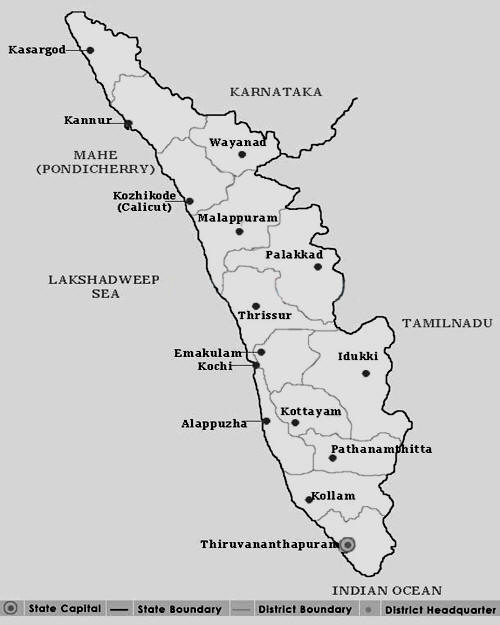|
Tamils - a
Nation without a State

Kerala
an estimated 750,000 Tamils live
in Kerala

Kerala is a state located in southwestern India.
Neighbouring states include Karnataka to the north
and Tamil Nadu to the south and east, and the
Arabian sea is to the west. Major cities include
the state capital of Thiruvananthapuram, Kochi and
Kozhikode. Malayalam is the principal spoken
language,
A 3rd-century-BC rock inscription by emperor Asoka
the Great attests to a Keralaputra. Around 1 BC the
region was ruled by the Chera Dynasty, which traded
with the Greeks, Romans and Arabs.
The Tamil Chera dynasty, Ays and
the Pandyan Kingdom were the traditional rulers of
Kerala whose patriarchal dynasties ruled until the
14th century AD.
Pliny the Elder who visited Kerala
in the first century AC reported in his book
Natural History (Pliny) that the Northern Kerala
was ruled by the Chera Kings while the southern
Kerala was ruled by King Pandion of Madura(the
Pandyan Kingdom) who had the capital at Nelcynda
with port at Porakkad (Ambalapuzha).
The Dravidian Villavar tribe which
established the Chera Kingdom were Patriarchal in
descendency. Ay kings ruled southern Kerala. The
Later Chera Kingdom otherwise called the
Kulasekhara dynasty was founded by King Kulasekhara
Alwar who is considered as a Vaishnavaite
saint.
After the repeated attacks of
Rashtrakutas in the end of first millennium the
Northernmost portions of Kerala, Matriarchal Naga
dynasties appeared in North Kerala at Ezhimalai.
later Chera Dynasty came to an end weakened by the
Rashtrakuta and Chola invaders.
Feudal Namboothiri Brahmin and Nair
city-states subsequently gained control of the
region. Kolla Varsham or Malayalam Era, which is
assumed to have been established by King Udaya
Marthanda Varma, King of Kollam, in 825 AD, serves
as the official calendar of Kerala. Early contact
with Europeans gave way to struggles between
colonial and native interests. Kerala state was
created on 1 November 1956 via the States
Reorganisation Act which merged the former state of
Travancore-Cochin, Malabar district of the former
Madras State, and Kasaragod taluk of Dakshina
Kannada.
Kerala is new sanctuary for fleeing Lankan
Tamils
P
Jayaram in Colombo, 14 April 2009
More and more Sri Lankan Tamils, fleeing their
homes in the civil war ravaged Jaffna peninsula,
are heading for a new haven overseas, the southern
Indian state of Kerala.
Over 1,500 Jaffna Tamils have already bought
property in different parts of the state,
particularly in Thiruvananthapuram, Kozhikode and
Palakkad districts and settled there
permanently.
Only about 40 per cent of them have bought real
estate legally, taking advantage of the
government's loose definition of a non-resident
Indian, or NRI. The definition includes all people
of Indian origin.
But a majority of the migrants have bought property
with forged certificates like that of birth and
marriage.
''My aunt said she had to spend Rs 25,000 as bribes
to officials to get these documents and there was
no problem,'' said one Tamil.
Kerala's natural beauty, its high literacy rate and
the Malayali's close cultural affinity to the
Jaffna Tamils, despite their language difference,
have all made the state an attractive destination
for the Sri Lankan Tamils.
With the Lanka's conflict showing no sign of
ending, the influx would continue, they added.
Earlier, Tamil Nadu was the main destination for
the island's Tamils. Hundreds of thousands fled the
state in the wake of the worst anti-Tamil riots in
Lanka in July 1983.
However, the outpouring of sympathy and goodwill
for the refugees did not last long and public mood
in the state took an about turn following the
assassination of Rajiv Gandhi by a Liberation
Tigers of Tamil Eelam suicide bomber.
''The people in Tamil Nadu feel that we are all
Tigers, the police and the intelligence agencies
have also been harassing those settled in the
state,'' said one source.
The movement to Kerala started around 1990. Though
earlier attempts by various Tamil militant groups
to enlist the support of the Malayalis for their
separatist campaign received hardly any support,
many Sri Lankan Tamils found the state ideal for
living.
Some Tamil leaders, like assassinated Eelam
People's Revolutionary Liberation Front leader K
Padmanabha, had taken up residence in Kerala for
security reasons and also because they felt
vulnerable to attacks by the LTTE in Tamil Nadu due
to the political patronage the Tigers enjoyed
there.
In fact, Padmanabha and about 20 of his associates
were massacred in Madras while he was on his way
back to Thiruvananthapuram from Delhi to join his
family.
Padmanabha's successor, K Premachandran, has also
lived in Kerala with his family. ''We very much
liked the place. Compared to Madras,
Thiruvananthapuram is smaller and cleaner. Apart
from the language, the food, social customs,
culture, everything is like ours,'' he said.
The social interaction between the Jaffna Tamils
and the Keralites has already resulted in
matrimonial alliances.
With most of the Jaffna families having one or more
members in the Western countries, mostly as
refugees, the high land prices in Kerala have not
dissuaded them from moving into the state. UNI
|